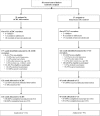Cognitive behavioral treatment for depressed adolescents: results from a cluster randomized controlled trial of a group course
- PMID: 31117989
- PMCID: PMC6532239
- DOI: 10.1186/s12888-019-2134-3
Cognitive behavioral treatment for depressed adolescents: results from a cluster randomized controlled trial of a group course
Abstract
Background: The group-based CBT intervention, the Adolescent Coping with Depression Course (ACDC), has previously been evaluated within a quasi-experimental design, showing reduction in depressive symptoms compared to a benchmark of similar studies. The aim of our study was to investigate the effectiveness of ACDC within a randomized controlled (RCT) design.
Method: Thirty-five course/control leaders randomly assigned to provide ACDC or usual care (UC) recruited 133 adolescents allocated to ACDC and 95 to UC. ACDC participants received eight weekly sessions and two follow-up sessions about 3 and 6 weeks after the last session. UC participants received usual care as implemented at the different sites. Depressive symptoms were measured with the Center for Epidemiologic Studies Depression Scale for adolescents (CES-D), perfectionism with the revised version of the Dysfunctional Attitude Scale (DAS), and rumination with the revised version of the Ruminative Responses Scale (RRS). Attrition was considered missing at random (MAR) and handled with a full information maximum likelihood (FIML) procedure.
Results: Intention to treat analysis (ITT), including baseline scores and predictors of missing data as control or auxiliary variables, showed a small to medium reduction in depressive symptoms for the ACDC group compared to UC (d = -.31). Changes in perfectionism and rumination in favor of the intervention were also significant. Sensitivity analyses confirmed the findings from the ITT analyses.
Conclusions: The current study supports the effectiveness of this group-based CBT intervention. The intervention can hopefully result in clinically significant reductions in symptoms associated with depression among adolescents.
Trial registration: ISRCTN registry ISRCTN19700389 . Registered 6 October 2015.
Keywords: Adolescents; Depression; Group-CBT; Randomized controlled trial.
Conflict of interest statement
The authors declare that they have no competing interests.
Figures



References
-
- Børve T. Manual for Depresjonsmestring for ungdom [manual for adolescent coping with depression course] Oslo: Rådet for psykisk helse (The Norwegian Council for Mental Health - NCMH); 2012.
-
- Whiteford HA, Degenhardt L, Rehm J, Baxter AJ, Ferrari AJ, Erskine HE, Charlson FJ, Norman RE, Flaxman AD, Johns N. Global burden of disease attributable to mental and substance use disorders: findings from the global burden of disease study 2010. Lancet. 2013;382(9904):1575–1586. doi: 10.1016/S0140-6736(13)61611-6. - DOI - PubMed
Publication types
MeSH terms
Associated data
LinkOut - more resources
Full Text Sources
Medical
Miscellaneous

